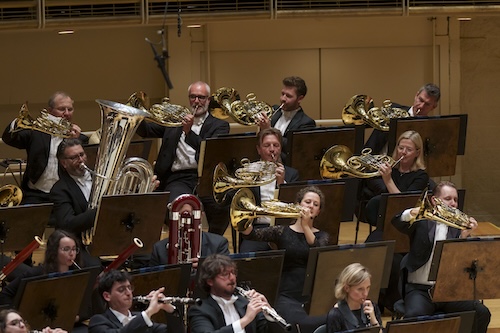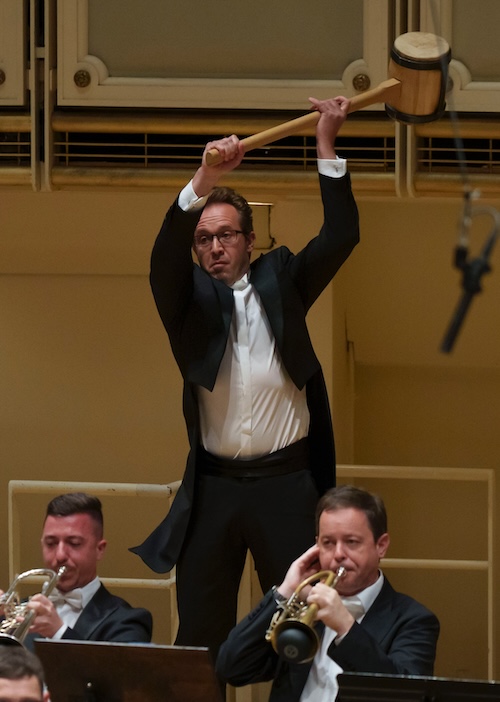Performances
Hrůša, Bamberg Symphony deliver a memorable evening of Brahms and Wagner in Boston
There’s nothing like making up for lost time. That, on the […]
Ma & Stott close long musical partnership in generous style in Boston
Yo-Yo Ma and pianist Kathryn Stott offered a fitting tribute to […]
Tetzlaff & Gerstein explore the radical side of Brahms and others for Celebrity Series
Arnold Schoenberg thought so highly of Johannes Brahms that he grafted […]
Concert review
Rattle, Bavarian Symphony deliver a brilliant, devastating Mahler tragedy

It’s been 15 years since Sir Simon Rattle last visited Chicago in what would be his valedictory local stand with the Berlin Philharmonic.
The British conductor, whose tenure leading the venerable Philharmoniker ended in 2018, took the reins of the Bavarian Radio Symphony Orchestra last fall. Sunday afternoon brought Rattle’s first local appearance with his new band, playing to a respectably filled house at Orchestra Hall.
Rattle and colleagues opened their four-city U.S. tour here with Mahler’s Symphony No. 6, well-timed for the team’s just-released recording of the same work. The program of Mahler’s Sixth in New York later this week will provide intriguing context by also including Hindemith’s Rag Time and Zemlinsky’s Symphonic Songs, but in Chicago the symphony was the sole work.
The BRSO (aka the Symphonieorchester des Bayerischen Rundfunks) last visited here under the late Mariss Jansons in 2016. This year the ensemble is marking its 75th anniversary and the Munich-based orchestra made a most impressive showing under their new leader.
The orchestra boasts a brilliant sound with especially gleaming violins (split left and right) and imposing brass. If they don’t quite equal the corporate tonal refinement of the world’s top orchestras—the woodwind front desks lack something in individual character as well—the Bavarians are clearly a superb orchestra and played with technical polish, ensemble unity and an athletic vitality.

While justifiably regarded as the grimmest of Mahler’s nine completed works in the genre, the Sixth Symphony possesses moments of compensating beauty, splendor and humanity.
Rattle, 69, remains a no-nonsense Mahlerian, and the quick-march that launched the opening movement was taken at a fast, nerve-wracked pace. While the Alma theme was suitably ardent, there was little lingering in the contrasting episodes with Rattle keeping a relentless forward impetus. One wanted a bit more light and shade at times. While immaculately balanced, the atmospheric effects didn’t all register, with the offstage cowbells sounding more like a pots-and-pans drummer on Michigan Avenue.
As in his previous recording of the Sixth Symphony with the City of Birmingham Symphony Orchestra, Rattle places the Andante moderato second and the Scherzo third (contrary to what was printed in the program). Though done less often, the conductor made a strong case for that ordering. Rattle conjured a mini-tone poem out of the slow movement, aided by spacious, resplendent solo horn playing from Andrew Bain, principal of the LA Philharmonic who is sitting in on this tour. Rattle drew luscious string playing, inexorably building the Andante—one of Mahler’s loveliest inspirations—to an expansive, rapturous climax.
The Scherzo, placed third, returns us to the darker world of the opening movement, effectively paving the way for the ultimate tragedy of the finale. Here too, Rattle’s tempo was driven and impellent, hurling us back to the haunted, quasi-militaristic nightmare that opened the symphony. Rattle pointed the contrasting sections effectively, with oboist Stefan Schilli contributing lilting charm in the first trio and Rattle drawing out the unsettling weirdness of the second.

The transition into the final movement seems to make more sense emerging from the Scherzo rather than the Andante. Rattle charted the nearly half-hour finale with consummate skill, making one almost believe that this time the energetic progress towards an optimistic conclusion would actually succeed. Consequently, the hammer blows of fate fell with even more devastating force and impact—the Bavarian percussionist wielding a huge, weighty hammer that delivered a leaden yet resonant thwack of irrevocable finality. (Heeding Mahler’s dicta, the third hammer blow was omitted.) The conductor was at his finest in the closing section, drawing out the pitiless descent into the yawing abyss, a violent final chord and resigned coda of despair.
Despite the deservedly clamorous ovations and repeated curtain calls for Rattle and his superb orchestra, there was no encore, as expected. After such a Mahler performance as this, what more can be said?
Sir Simon Rattle and the Bavarian Radio Symphony Orchestra perform at the Kennedy Center in Washington DC on Tuesday, in Philadelphia on Wednesday, and at Carnegie Hall in New York Thursday and Friday.
Articles
Stephen Hough’s new concerto looks to the past as well as the future
Sir Stephen Hough’s response as to the inspiration for writing his […]
DG recordings from four celebrated pianists to close the musical year
Rachmaninoff: Piano Concertos Nos. 1-4; Rhapsody on a Theme of Paganini. […]
News
American Music Project to present a full 2024 season with three concerts
The American Music Project will mark its 10th anniversary in ambitious […]
Subscribe
![]() Subscribe via RSS
Subscribe via RSS
![]() Follow on Twitter
Follow on Twitter